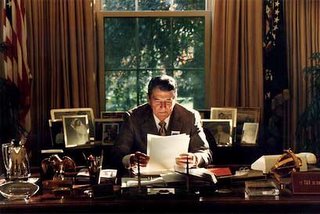
I’m continually baffled as to why
Hillary Clinton is referred to as the far-and-away frontrunner for the Democratic Presidential nomination in 2008. Yes, I understand her celebrity and, sure I appreciate the novelty of having a candidate who used to be the first lady. But really…are Democrats really thinking through what they’re getting when they anoint her as their favorite-son (daughter)?
It wouldn’t be the first time a candidate road the coattails of a popular President to win their party’s nomination (you listening
Bush 41?), but I wonder if the “Clinton” mystique is getting ready to hit a brick wall. By all accounts Bill Clinton has an uncanny ability to connect with virtually anyone he meets. It is said that in a conversation with President Clinton he makes you feel as if the whole world is about you. Honestly, pudgy, middle-aged white guys do not get the title “
America’s first black President,” without "mad" interpersonal skills.
Other than the celebrity, I just don’t see what it is about Hillary Clinton’s candidacy that makes Democrats swoon. Okay, yes, I’m biased. Based on her stated beliefs I think her policies would be a total disaster for the United States. But trying to be objective, and looking at just the basics, just exactly what kind of candidate do they have.
She’s Polarizing – Hillary Clinton is possibly one of the most polarizing political figures in America today. Hillary is to conservatives what “
W” is to
Moveon.org. You either love her or you hate her. Bill Clinton was able to bring out the moderate votes, in fact, he based much of his first campaign on being a pro-business moderate Democrat. Heck, I voted for him (the first time).
She’s a New York Liberal - She may hail from Arkansas, but she wasted no time in knocking the dust off those boots as soon as Bill was out of office. To get elected as a Democrat way back to
LBJ you needed some Southern “street cred,” and she forfeited that when she moved to New York state to run for Senate. People with that liberal tag don’t do well in the presidential election. Sure, she’d win New York state in a landslide (provided
Rudy doesn’t run), California, and of course Minnesota, among others, but everywhere else she is a “New Yawk Liberal,” with all the connotations that come with it.
She’s a Senator - I always bring this one up. We don’t hire too many Senators in this country to be the Commander-in-Chief. The last President who was a Senator was Lyndon B. Johnson, but of course the last one we actually elected was
John F. Kennedy. I think
John Kerry was the perfect example of why we reject congressman as Presidential candidates. Who ever knew what the guy was talking about? The Senate is an old boys club that is run by obscure rules of order known mostly to themselves. If you don’t believe me, read the great book on LBJ called
Master of the Senate. Senators “do” less and “argue in circles” more. We’re Americans and we want a “
doer!”
She’s a woman – In my opinion the United States absolutely IS ready for a female commander in chief. I’m not just being egalitarian by saying so either. And certainly no one thinks of Hillary as a soft, “
Holly Hobby” homemaker type. However, I do question whether her “toughness” will play in Peoria. I can see soccer moms coming out to vote for her (despite the “
I could have stayed home and baked cookies” comment), but I do have a hard time seeing “NASCAR dads” coming out to vote for her. Despite her recent attempts to look tough and be
strong supporter of the Military , I think she’ll have a perception of softness hurdle to get over – which I honestly think would unfairly be put against any woman candidate. I do think of Hillary as tough (if misguided), and I do think she would apply military force as commander in chief. I just always think of our first woman president as more an
Iron Lady type.
She’s not Bill – As I mentioned up above, Hillary doesn’t have the magic touch the way Bill does. They call him “
The Natural” after all. I’m not suggesting that you have to be overly gifted in this way to get elected, but I wonder if there’s some transference going on here where all her admirers think they’re going to get the Bill Clinton touch.
She stands for what?– To be a leader you have to stand for something. For the life of me I don’t know what Hillary stands for yet. I’m certain she’ll put something together as part of a formal campaign, but so far all I get is…“because she’s Hillary!” That might work to her advantage in far-left circles, but last time I checked you had to appeal to the middle to win the
Electoral College. I’m just looking forward to hear what she stands for. Is it the same as Bill Clinton or does she have her own philosophy, and if so, how are they different?
Doesn’t anyone else just want “new blood” in the White House? I’ve said the same thing about the Bushes as the Clintons – In a country of 300 million citizens; can we really not find a few candidates who are NOT a direct relation of a former President? I’m sure some will argue (again) that it’s a two-for-one deal – elect Hillary and get Bill to boot! You know what, I’ll pass.
My personal bet this early in the nomination race is
Joe Biden . The guy never fails to drive me nuts when he’s on the talking head shows, but he’s smart, he’s tough, and I think he’d make a formidable opponent to the open Republican field (and yes, I know he's a Senator). John Kerry will run again, but to steal a
Dennis Miller line, he’s going to get “stomped like a Narc at a biker rally!”































